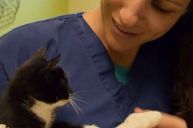While any warm-blooded animal can carry the rabies virus, rabid raccoons are the primary carrier of the deadly virus in the U.S.
In the United States, raccoons are common wild animals that can usually be found around garbage cans. Yes, with their nimble paws, these "trash pandas" can get into almost anything, often creating chaos and wreaking havoc surrounding your home. Raccoons are also known carriers of the deadly rabies virus, and while any mammal can carry rabies, raccoons are one of the primary carriers of this highly dangerous virus. (Skunks are another one!)
More importantly, the rabies virus can easily spread to humans by any direct contact with an infected animal either by a bite, a scratch, or even by coming into contact with their saliva. Although most raccoons you come across are healthy and not particularly rabid, if you see a raccoon, be sure to call your local animal control — you'll also want to keep an eye out for these signs of a rabid raccoon.
How to Recognize a Rabid Raccoon
https://www.instagram.com/p/B_N7j9Bnjh_/
These are five signs to tell if a raccoon is rabid:
1. Difficulty walking: rabies can paralyze raccoons' hind legs, leading to a staggering gait.
2. Disorientation and confusion with their surroundings: rabid raccoons will appear slow and disoriented (often wandering lost), while healthy raccoons are alert and agile.
3. Making strange noises: the animals will make strange noises, often recurring high-pitched vocalizations — they'll even whimper.
4. Just looking sick: sometimes, rabid raccoons can be pretty easy to spot. Like most humans, sick animals will very likely look, well, sick. Even though it's not deadly, raccoons with distemper can also look like raccoons with rabies.
5. Foaming at the mouth: this is a clear-tell sign — if you are close enough to notice this, you need to back away!
https://www.instagram.com/p/BvnCNJ-HDoH/
If you see any of these signs in a raccoon or other animal, don't go near it! Be sure to give these stray animals plenty of space and call for raccoon removal. If you ever get bitten by a rabid raccoon, get help immediately as there are rabies vaccinations you can have to prevent the virus from getting to the central nervous system and causing the real damage.
According to the CDC, there has only been one death from the raccoon strain of rabies. Follow the Department of Health and Environmental Control for news of rabid raccoons.
Ever come across a rabid raccoon before? Share your story on the Wide Open Pets Facebook page!




